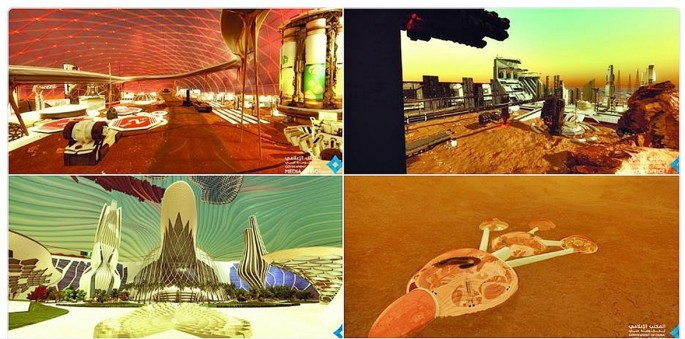The tiny but oil-rich United Arab Emirates (UAE) plans to become the first country on Earth to build the first habitable Earth city on Mars by 2117.
The government of this wealthy Middle East nation, whose leading tourist attraction is the Burj Khalifa (the world's tallest structure) in Dubai, on Feb. 14 revealed the boldest plan yet for the human colonization of Mars.
In sheer size, scope, ambition and brashness, the UAE's City on Mars (yet unnamed) dwarfs any existing plan to colonize Mars. NASA and SpaceX only have plans to establish Martian outposts for less than a dozen scientists.
The UAE will build a city on Mars probably housing hundreds of persons as part of the Mars 2117 Project in collaboration with specialized international organizations and scientific institutes.
That the UAE's City on Mars isn't a joke or fake news was underscored by the high status of the men who made this announcement.
The Mars 2117 Project was made public by Shaikh Mohammad Bin Rashid Al Maktoum, Vice-President and Prime Minister of the UAE and Ruler of Dubai, and Shaikh Mohammad Bin Zayed Al Nahyan, Abu Dhabi Crown Prince and Deputy Supreme Commander of the UAE Armed Forces.
"The landing of people on other planets has been a longtime dream for humans. Our aim is that the UAE will spearhead international efforts to make this dream a reality," said Shaikh Mohammad Bin Rashid.
He emphasized that the project prioritizes the building of scientific capacities of Emiratis, and transforming Emirati universities into research centers, thus consolidating the passion of leadership in our generations to come.
As part of a 100-year national program, the UAE will prepare a plan to organize what it calls "national cadres" that can achieve scientific breakthroughs that will facilitate the transport of people to Mars over the next decades -- presumably in cooperation with NASA and private American space transport firms such as SpaceX.
The 100-year plan will involve scientific research programs to nurture national cadres specializing in space sciences at universities in the UAE. It will also entrench a passion for space in younger generations.
A virtual presentation depicting a preliminary concept for the City on Mars was made during the announcement in Dubai at a meeting of the UAE-sponsored World Government Summit.
UAE officials said the scientific initiative of the 2117 Mars project will first be implemented by an Emirati scientific team. It will eventually be expanded to include international scientists and researchers. This activity will run in parallel with the coordination of human research efforts in the field of exploring and inhabiting Mars.
Shaikh Mohammad Bin Rashid said the UAE is ranked among the most important nine countries in the world that invest in space science, and that the country's goal is to accelerate human researches in this field.
"Human ambitions have no limits, and whoever looks into the scientific breakthroughs in the current century believes that human abilities can realize the most important human dream," he added.
"The new project is a seed that we are planting today, and we expect the next generations to reap its fruits."
Shaikh Mohammad Bin Zayed said the short-term goal is to develop the capacities and skills of Emiratis.
"The 2117 Mars initiative is a long-term project, which will first help develop our education, universities and research centers that will empower young Emiratis to enter all disciplines of scientific research fields," said Shaikh Mohammad Bin Zayed.
"The findings of the project will be available to all international research institutes."
He noted that the research outcomes will contribute to aspects of transportation, energy and food as part of the Mars project to achieve scientific breakthroughs that contribute to developing human life on Earth.
"The UAE has become part of dynamic human scientific efforts to explore space and making scientific contributions to human knowledge," said Shaikh Mohammad Bin Zayed.
"With the launch of this project, we begin a new journey that will last for decades to come, and it will speed up human endeavors to explore other planets."
Earlier, an Emirati team of engineers and a group of scientists and researchers developed a concept for the first human city on mars that will be built by robots.
The plan showcased during the summit highlighted the expected lifestyle on Mars in terms of transport, power production and providing food, as well as infrastructure works and materials used for the construction of the city.
In 2015, the UAE announced its Mars Probe mission, which will send the Arab world's first spacecraft to the Red Planet in a scientific exploration mission that will land on planet in 2021.



























